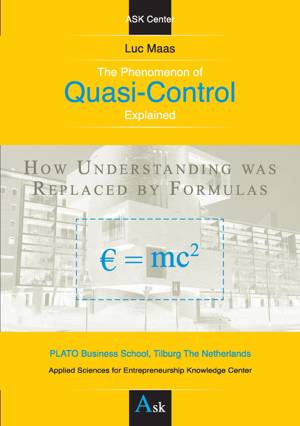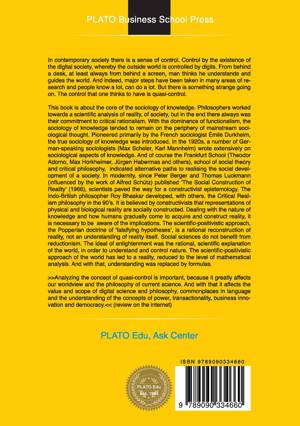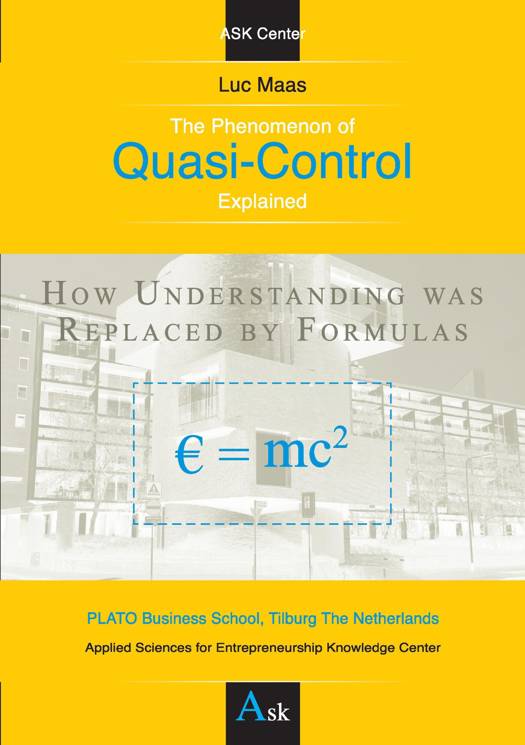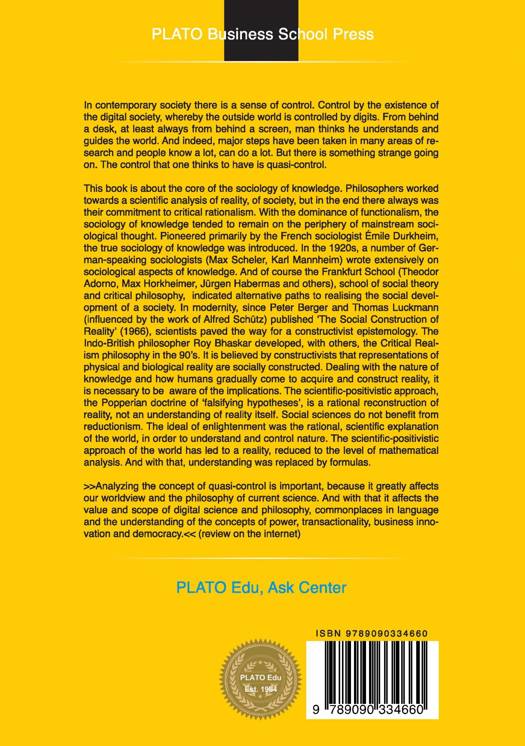
- Retrait gratuit dans votre magasin Club
- 7.000.000 titres dans notre catalogue
- Payer en toute sécurité
- Toujours un magasin près de chez vous
- Retrait gratuit dans votre magasin Club
- 7.000.0000 titres dans notre catalogue
- Payer en toute sécurité
- Toujours un magasin près de chez vous


Description
In contemporary society there is a sense of control. Control by the existence of the digital society, whereby the outside world is controlled by digits. From behind a desk, at least always from behind a screen, man thinks he understands and guides the world. And indeed, major steps have been taken in many areas of research and people know a lot, can do a lot. But there is something strange going on. The control that one thinks to have is quasi-control.
This book is about the core of the sociology of knowledge. Philosophers worked towards a scientific analysis of reality, of society, but in the end there always was their commitment to critical rationalism. With the dominance of functionalism, the sociology of knowledge tended to remain on the periphery of mainstream sociological thought. Pioneered primarily by the French sociologist Émile Durkheim, the true sociology of knowledge was introduced. In the 1920s, a number of German-speaking sociologists (Max Scheler, Karl Mannheim) wrote extensively on sociological aspects of knowledge. And of course the Frankfurt School (Theodor Adorno, Max Horkheimer, Jürgen Habermas and others), school of social theory and critical philosophy, indicated alternative paths to realising the social development of a society. In modernity, since Peter Berger and Thomas Luckmann published ‘The Social Construction of Reality’ (1966), scientists paved the way for a constructivist epistemology. The Indo-British philosopher Roy Bhaskar developed, with others, the Critical Realism philosophy in the 90’s. It is believed by constructivists that representations of physical and biological reality are socially constructed. Dealing with the nature of knowledge and how humans gradually come to acquire and construct reality, it is necessary to be aware of the implications. The scientific-positivistic approach, the Popperian doctrine of ‘falsifying hypotheses’, is a rational reconstruction of reality, not an understanding of reality itself. Social sciences do not benefit from reductionism. The ideal of enlightenment was the rational, scientifical explanation of the world, in order to understand and control nature. The scientific-positivistic approach of the world has led to a reality, reduced to the level of mathematical analysis. And with that, understanding was replaced by formulas.
This book is about the core of the sociology of knowledge. Philosophers worked towards a scientific analysis of reality, of society, but in the end there always was their commitment to critical rationalism. With the dominance of functionalism, the sociology of knowledge tended to remain on the periphery of mainstream sociological thought. Pioneered primarily by the French sociologist Émile Durkheim, the true sociology of knowledge was introduced. In the 1920s, a number of German-speaking sociologists (Max Scheler, Karl Mannheim) wrote extensively on sociological aspects of knowledge. And of course the Frankfurt School (Theodor Adorno, Max Horkheimer, Jürgen Habermas and others), school of social theory and critical philosophy, indicated alternative paths to realising the social development of a society. In modernity, since Peter Berger and Thomas Luckmann published ‘The Social Construction of Reality’ (1966), scientists paved the way for a constructivist epistemology. The Indo-British philosopher Roy Bhaskar developed, with others, the Critical Realism philosophy in the 90’s. It is believed by constructivists that representations of physical and biological reality are socially constructed. Dealing with the nature of knowledge and how humans gradually come to acquire and construct reality, it is necessary to be aware of the implications. The scientific-positivistic approach, the Popperian doctrine of ‘falsifying hypotheses’, is a rational reconstruction of reality, not an understanding of reality itself. Social sciences do not benefit from reductionism. The ideal of enlightenment was the rational, scientifical explanation of the world, in order to understand and control nature. The scientific-positivistic approach of the world has led to a reality, reduced to the level of mathematical analysis. And with that, understanding was replaced by formulas.
Spécifications
Parties prenantes
- Auteur(s) :
- Editeur:
Contenu
- Nombre de pages :
- 225
- Langue:
- Anglais
- Collection :
- Tome:
- n° 1
Caractéristiques
- EAN:
- 9789090334660
- Date de parution :
- 27-07-20
- Format:
- Livre broché
- Dimensions :
- 147 mm x 208 mm
- Poids :
- 292 g

Les avis
Nous publions uniquement les avis qui respectent les conditions requises. Consultez nos conditions pour les avis.







